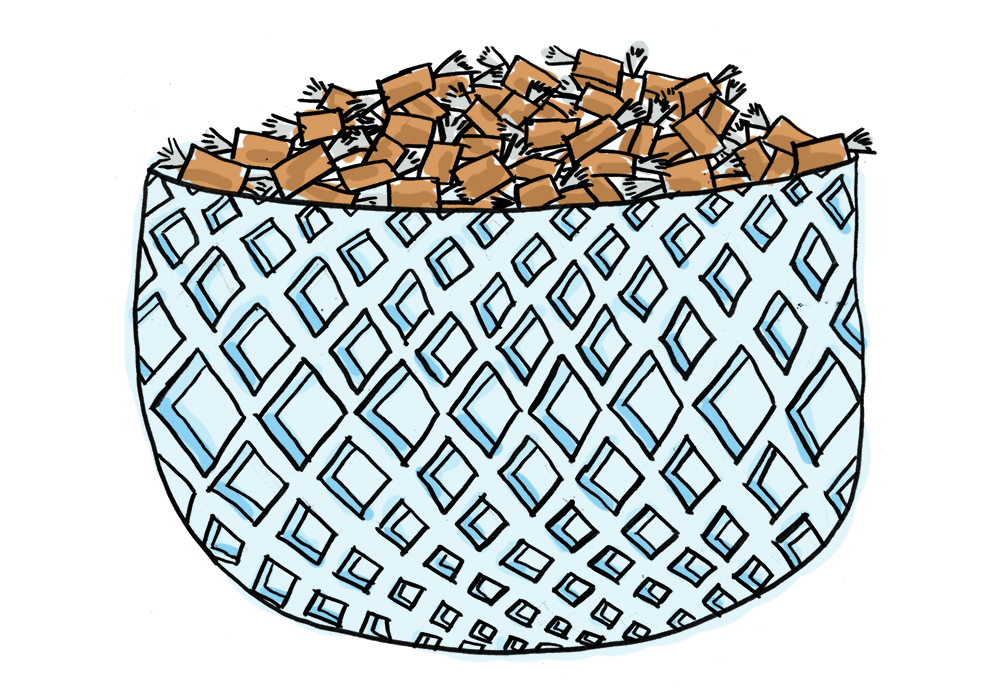The star shape cuts into the circular handle that tops the lid of my candy dish. The star is echoed as it expands into the many cut diamonds which multiply as they eclipse over the round shape of the lid. The pattern starts again where the lid meets the bowl, continuing on and on all the way to its base. As the diameter of the bowl’s circular shape increases, so, too, does the size of the diamonds, only to follow the reverse pattern as it decreases in size where the bowl’s shape comes together in a nice gathering of diamonds at the bottom. The pattern seems to be infinite, and yet it is not. It finishes at the base of the bowl.
It is an old bowl, a treasured possession of my Gran’s. It always sat on her coffee table, and it was always full of candy, mostly the soft caramel toffees that she loved so much. As children, we were allowed to have one, but only one, and only after we had eaten the sumptuous feast that Gran had prepared for our visit. She always made our favorites — fried chicken, mashed potatoes, and coleslaw. My mouth waters at the memory of these special recipes.
I make Gran’s chicken for supper. I coat the chicken pieces with cornflake crumbs, salt, and pepper and bake it in the oven. Then I make the coleslaw with her unique combination of cabbage and raisins. I add small, colored marshmallows. The salad dressing, another of Gran’s secret recipes, softens the marshmallows so they melt in your mouth. My kids like the spongy sweetness next to the bitter crunch of the cabbage. I don’t recall if Gran ever added marshmallows to the salad. Perhaps she did.
I watch my son devour his chicken. Using his fingers to eat the drumsticks, he looks like a sweet cherub covered in sticky cornflake crumbs. His eyes catch mine watching him and he smiles, “Great chicken, Mom,” he says with his mouth full. “Can you make this again tomorrow night?”
I chuckle at the compliment. I seldom hear positive comments about food. Usually, it’s just there, and it’s eaten. “Maybe not tomorrow night,” I answer. “But I will make it again since you seem to like it so much.”
My daughter has already finished her chicken, and she is busy picking the marshmallows out of her salad. Or, more accurately, she is scraping the other stuff off the marshmallows. “Maybe next time you can leave out the green stuff,” she suggests. My son nods in agreement.
“That would be really silly,” I say. “What would a cabbage salad be without the cabbage?”
“A marshmallow salad?” they suggest, and we share a laugh.
The conversation lingers over the particulars of salad combinations. My children would never have made good rabbits. But at least they like to eat. Gran had a good appetite, too. How she loved her food! If she wasn’t preparing it, serving it, or eating it, food was being discovered in new recipes cut from magazines. Sweets were always readily available in the stacks of candy boxes scattered around, along with the crystal candy bowl, which, of course, was always full.
I don’t remember Gran’s candy bowl ever being empty. Its ability to stay full remains a mystery from my childhood. Its fullness was a sense of infinity and the everlasting, just like the pattern on the bowl itself. The bowl was my Gran, full of sweetness and love and always there. Gran was everlasting. She had always been there and she always would be there. We, the four grandchildren, thought so, anyway. But the infinite pattern finishes on the base of the bowl and becomes finite. So, too, did Gran’s life reach its finiteness. We always teased her that she would live to be 100 and see the new century arrive. Each year on her birthday, she would comment about her age. “80 years is such a long time,” she would say, only to revise it five years later by saying, “85 years is such a long time.” Another five years pass and she says, “90 years is such a long time.” Each year Gran would also inform us that she wouldn’t live to see her next birthday.
“You’ve been saying that for as long as I’ve known you,” my dad always chided her.
Gran would laugh. “I know I have, but I really am getting so old now. You have to remember that my parents died in their 50s!”
“We remember, Gran,” we all chirped together. “You’ve only been telling us that for the last 40 years.”
Gran claimed that she had no desire to see the next century, “The world is going too fast for me, now,” she would say. “With computers and all the technical equipment that they make today, I find it difficult just figuring out how to turn on my radio.” I remember how hard it was to buy her just a simple radio, one with a real knob, a big knob, to turn it on and off. Most radios today have tiny buttons to press, which are difficult for arthritic fingers to manipulate, let alone find. Even the instructions and the labels on these new radios require powerful magnifying glasses to decipher. The mechanics are certainly not senior-friendly. When we finally did find her a simple on/off radio, we prayed that it wouldn’t break down and need replacing anytime too soon.
Gran marvelled at progress, but she felt that she just couldn’t keep up. “You can’t teach an old horse new tricks,” she tried to explain. Dad did try to teach her basic computer programming skills at one point. But she still preferred her heavy-duty manual typewriter for writing her letters and minutes to the ACW meetings. Yes, the 20th century had been quite enough for Gran. The changes she had seen in her lifetime seem infinite, like the bowl. After all, even the changes seem to change and not always for the better. She went from the horse and buggy lifestyle to owning a Model T at the age of 18. She gave up driving at the age of 50. She was living in Toronto at the time and the rush of traffic, the streetcars, and the parking had become too nerve-wracking for her. So she sold her car, and she didn’t bother to renew her driver’s license. She resorted to streetcars, family and friends, and, of course, her own two feet. She walked everywhere.
After retiring for the umpteenth time at the age of 70, she returned to Simcoe to live in the house that her husband had built in the 1930s. From that house, she walked to church and downtown to shop. Her neighbour once commented on how she could set the time of day by the sound of Gran’s passing footsteps. The heels of Gran’s shoes would click at a faster pace when Gran was going into town in the morning and at a much slower pace on her return later in the day. She claimed latterly that it was her two feet which had served her so faithfully for over 90 years that kept her in such good health for a long life. It certainly kept the grandchildren in good shape, since whenever we visited Gran, we were expected to walk with her wherever she went. To this day, I still enjoy walking.
“Let’s go walk the dog,” I announce as I finish putting the supper dishes away.
“Again?” my son complains. “We walked him this morning.”
“There’s nothing like a good brisk walk to loosen up the leg muscles and help that wonderful supper digest,” I say.
The kids groan. “I think I heard Great Gran say something like that a long time ago.”
I smile. “You probably did,” I agree. “Let’s go.”
Our dog is ready to go. Just the word “walk” makes him eager and waiting at the front door, tail wagging. “But it’s starting to rain,” my daughter says.
“So it is,” I reply, “but let’s go anyway. It’s a nice warm, summer rain.”
“It might be acid rain, Mom,” they suggest.
I laugh. “You’ve walked through worse. Besides, this is Ottawa, not Toronto. Come on, let’s go!”
Gran seldom complained about the weather, unless it was icy and slippery. She walked through all kinds of weather for as long as her legs and her sense of balance would allow her to walk. Then, when she was in her 90s, she moved into a seniors apartment. And she still walked, only now she walked inside the corridors, visiting friends both old and new.
Gran may have walked through much of the 20th century, but she found all the changes of this century both a challenge and a battle of wills, rights, and the equality (or inequality) of the sexes. She battled with her independent spirit when her parents chose to educate her younger brother instead of her. The early 1900s was a time when men were still considered to be superior in all things. The stern Scottish upbringing that Gran and her brother had received was not uncommon considering the Old-World principles and beliefs that her parents maintained in their new life as Canadians. Many talented and brilliant women like Gran were still considered to be inferior to men and not worth the cost and the time involved in pursuing a higher education. It was only natural, considering the age-old beliefs, for a parent to consider further education for the boy instead of the girl. “After all,” her mother had told her, “you’ll just get married and have children. So what’s the point of educating you? It would be a waste of both time and money.”
Gran had to give up her dream of becoming a nurse. Instead, she trained to become a secretary, which required less education. Her women’s lib feelings had to be curtailed and put on hold until the next generation arrived. Then, as she struggled to care for a sick husband, raise two girls on her own, care for her parents and in-laws, and run the family store in order to keep food on the table during the depression, Gran could only hope for a better life for her girls, a life which would include a higher education. She would see this goal attained. She worked hard in the store, and later she returned to secretarial work as she watched the next generation of women succeed where she had not been allowed to succeed. She took pride in her daughter’s accomplishments as a teacher and later in her granddaughters’ accomplishments as musician, teacher, and writer. She may have missed out on the opportunities that the women of more recent generations have had, but she took everything in her stride and without bitter regret. “Life is too short for regrets,” she would say. “Always make the best of what you have.”
Gran’s death at the age of 93 was quite unexpected. In fact, it was a shock. It came without any warning. I had just seen her the week before. We had gone to her favourite fish and chips restaurant in Port Dover, and we stuffed ourselves silly. That’s what one does when good food is served. I don’t think I had ever seen Gran eat so much. She was determined to eat every last crumb. Did she have a premonition that this would be her “last supper” with us? I recall she tried to hide her roll in her purse so that she could take it home for later. I convinced her, carefully, that it might not be such a good idea. After all, she would be having another good meal at her seniors residence later that same day. The roll would only make a mess in her purse and then dry out, forgotten, in some corner of her apartment. She agreed reluctantly and left the roll. But she insisted on paying for the meal. There were five of us at the table — myself, my husband, my two kids, and Gran. At about 15 dollars per person, plus taxes and tip, I certainly didn’t expect Gran to pay for it. It was supposed to be our treat. But Gran had always paid her own way. I carefully (again) convinced her that it was our treat, and she reluctantly put away her ten-dollar bill. I guess her mind was set on an earlier time when ten dollars would have been enough to cover the bill. Her heart was in the right place, even if she had lost touch with the reality of the cost of living at the end of the century.
After paying the bill, which was closer to 80 dollars, we drove down to the sandy beach and recalled the summers past. We could have walked, but Gran was a bit unsteady on her feet and feeling the effects of a big meal. The drive was like a trip down memory lane for both Gran and me. In the ’60s, I had come to Simcoe each summer to spend some time with Gran, just me alone. Each of us grandchildren had the privilege of time alone with Gran. And we all looked forward to it. The highlight of our holiday with Gran always included a bus ride from Simcoe to Port Dover, a walk along the beach, and a foot-long hot dog for lunch, which we would consume with great relish as we sat by the water’s edge. No one else in the whole world made foot-long hot dogs, or so we believed.
After our reminiscing in Port Dover, we ventured down to Port Ryerse. Here we had once spent summers at our family cottage. The cottage was gone. Even the beach was almost non-existent. We didn’t get out. We preferred to remember it the way it had been — all those years ago. We crossed the creek that we had once rowed along en route to Lake Eerie and the sandy beach. We passed the General Store where we had once enjoyed an ice cream cone after a hot afternoon at the beach. We rounded the bend and saw the property that had once been our cottage. We looked at the old farm house across the road and recalled the stories often told so long ago of the fortress-like reinforcements that had defended it during the War of 1812. Then, we drove up to the Port Ryerse Church where unknown soldiers of the War of 1812 were buried, soldiers from both sides of the border. We contemplated the tragedy of these soldiers and what their families must have felt, never knowing what had happened to their boys — sons, brothers, husbands, friends. We couldn’t go inside the church, but Gran described it for the benefit of the children and my husband. I listened and I remembered it as a child. Our summer days at the cottage always included Sunday morning church services. I remember the smell of the polished wood interior mixed with the musty dampness of the old church building. I remember the wooden pews which were so impossibly hard. Sitting still was next to impossible during the long sermons. One’s behind would be numb from the hard seat and the heat made one stick to the wood when trying to stand up. I also remember the sounds inside the church. Each sound seemed to amplify against the many-sided hardwood surfaces. The sounds were more like those one would find in a sealed wooden box rather than a place of worship. But the church still felt sacred. It was this simple structure that seemed to speak volumes of one’s simple, steadfast faith. I almost wished that we could go inside so that I could once again sit on the hard pews and just listen.
While I silently reminisced about the church, Gran talked nostalgically of her other daughter, my mom’s sister, who had died tragically in Detroit. She was buried in Detroit, far away from her family. But the communion service at the Port Ryerse Church had been Gran’s gift in her daughter’s memory. There was a plaque somewhere in the church, a tribute to Gran’s lost daughter. So many things had happened, so many years ago. There were so many memories.
A week later, Gran died. It was a hot summer. She had always had heart trouble, and the heat had started to give her trouble. She had difficulty breathing, like the Sunday morning so many summers before, when she had fainted in church. She had been rushed to the Emergency room and put on life support. She had lived then. But the poor rector was teased when he came to visit Gran later that day. The nurses asked him if his sermons always had this effect on the congregation. Yes, Gran had lived many years after that fateful stopping of her heart, all due to a marvelous device called a pacemaker. She used to worry aloud about this pacemaker. It only had a ten-year life expectancy. She never expected to outlive the pacemaker. She almost did, and perhaps she would have if the intern on duty that fateful night in July hadn’t tried to play God. He decided at 93, Gran had already had a good long life. He tried to revive her, so he said. But he later told mom, “There wasn’t much point at the age of 93.” Yes, there was a point! I keep screaming in my head. She’s my Gran! She’s always been there! She’s my foundation, the root of my being, my everlasting. But she wasn’t everlasting. Mom had accepted the intern’s report. She lived closer to Gran and she saw Gran more often than the rest of us. Gran had suffered a great deal in the last few months of her life. So perhaps it was meant to be. But did the intern have to play God? Did he really have to let her die?
What was meant to be was meant to be. That’s what Gran would have said. That realization doesn’t necessarily always make the acceptance of reality any easier. But then Gran would have been the best example of endurance. She had lived through two world wars. She had sent family and friends overseas. Many came back permanently maimed. Others did not come back at all. She had cared for a sick husband for ten years, never to see him rise out of his bed and recover. She had cared for sick parents and other family members. She had lived in Detroit for a few years, trying to reclaim her brother from the depression of a failed marriage and the grips of an alcoholism that would eventually kill him. She had survived the brutal onslaught of the merciless media when her daughter had died tragically in a car accident. Auntie Jo had been pregnant with her first child at the time. Both mother and unborn child had died instantly when the car her husband was driving had collided with an oncoming train. The media wanted a story. They wanted to tell a story about a marriage gone sour and a husband who had survived the crash which shouldn’t have happened. They wanted to tell the mythical story of a husband deliberately causing an accident to rid himself of his wife. Had he been cheating on her? They asked. Were the couple arguing at the time? They wanted to know. They were a miserable bunch of leeches who descended upon a grief-stricken family. But what could be done about it? Nothing, except standing tall, as Gran always did, “Stand proud and show the world what you’re made of,” she would often say. And she did. But she never talked about Auntie Jo’s death. Growing up, I only knew about Auntie Jo because Gran always called me Jo. I looked so much like her, she explained. When I asked who Jo was, I was told. “She’s your mom’s sister, but she’s dead, now. She died before you were born.”
The diamond shapes cluster at the base of the bowl, like the family that comes together to mourn the death of a loved one. We were all there. John felt it was as if Gran had planned it that way. He was home for the month of July — home from his job in Abu Dhabi. He only got home once a year. And he was about to return. Had Gran died a few days later, John would not have been there. Gran wanted us there. She had always worried that we would soon forget her once she was gone. That would never be. Even today, six years later, we talk of her as if she were still alive. We often wonder what Gran would think or do in a certain situation. She had warned us that she would always be watching, and we all admit to feeling her eyes upon us whenever we do or think of doing something that she would not approve of — like borrowing money. “If you can’t afford it, don’t buy it,” we still hear her say. How times have changed. With plastic money and credit, the sky’s the limit. Eventually, we must all pay. But it’s so different from 1932 when Gran and her husband asked the bank for money to buy a small grocery store in Simcoe. This was to be their livelihood through the depression years. This is where Grandpa would lay sick and eventually die. This is where Gran would work long hours, cutting meat, dragging 100-pound bags of potatoes up from the basement, measuring foodstuffs, keeping the books straight, helping out those who could not afford to buy the food they needed. She would barter for food — like the farmer who couldn’t buy some much needed staple items. Gran traded the items for a pig, which she then had to butcher herself.
The store profited during the depression without taking advantage of others. The store profited where the banks said it would fail. The banks had refused the initial loan. Gran and Grandpa had to borrow 300 dollars from family. They started out with only a few items on the store shelves. As those items sold, they bought more and reloaded the shelves, until they could purchase and maintain a full supply of goods. It’s small wonder that Gran never put much value in the banks. They couldn’t see their way to giving her a chance and she managed very well without them. She supplied credit for her customers long before the banks issued plastic cards. Her credit was based on trust and knowing her clients. She didn’t need the lengthy application forms and the credit checks. Her method worked. It was hard work, but it paid off in the long run.
The banks were not the only institution to lose Gran’s respect during the ’30s. While Grandpa lay sick in bed, he depended on his wife to run the business, his two daughters to entertain him and run errands, and the pleasure of company to pass the time. Today’s dialysis machines would have helped Grandpa, but in the 1930s, he could only lie in bed and suffer as his body bloated while the extra fluids built up. He was over 300 pounds when he died. Growing up a staunch Scottish Presbyterian, Gran had switched to the Anglican church when she married her English husband. Neither church sent prayers or even bothered to visit Grandpa. It was the Roman Catholic priest who would visit Grandpa regularly. For this, Gran almost became a Catholic — almost, but not quite. In later years, she would recall the kind priest who made her husband’s discomfort somewhat bearable. As she walked past the same Catholic church on the way to her own Anglican church, she would pause before its picture glass windows and look in, supposedly to straighten the hemline of her dress. But perhaps, also, she was wondering, what if . . . ?
We return from our walk, wet but refreshed. “Can I have a candy?” my daughter asks.
“You mean ‘may I?’” I correct her grammar. “And yes, you may have one candy, but only one.”
My daughter smiles in anticipation. Her brother is already standing by the candy bowl waiting for his treat. The bowl is full, but not with the soft toffees that Gran liked. I prefer the hard candies, the mints and the fruit-flavored ones. My children choose their candies, and then my daughter replaces the lid. The pattern is again complete. The top is once again connected with the bottom.
I keep the crystal bowl on my coffee table. It is a centrepiece of sorts. I try to keep it full of candy. By keeping it full, I remember all the things that Gran was. She was so full of life and full of her unbending, unconditional love. Each time I look at it, my memories of Gran resurface. As I study the pattern, I marvel at the similarities between life and the simple but intricate design that has been carefully etched into this crystal bowl. Each of our individual lives is like this crystal bowl, carefully and intricately designed in an interlocking pattern that is both infinite and finite. •
All images by Isabella Akhtarshenas.










